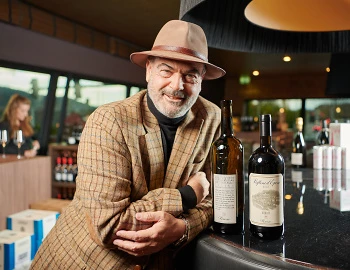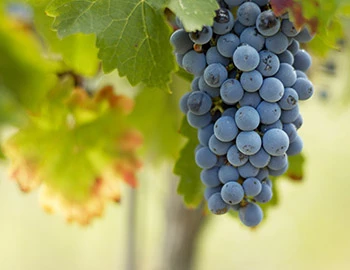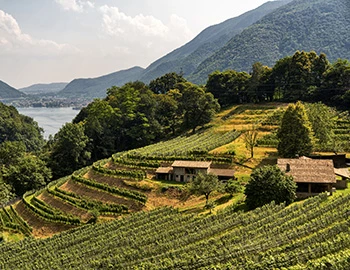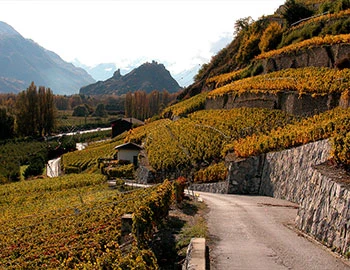Merlot Baiocco 2022
DOC Ticino, Brivio, 750 ml

| Grape variety: | Merlot |
| Producer: | Brivio / Gialdi |
| Origin: | Switzerland / Tessin / Sottoceneri |
| Other bottle sizes: |
Description
The Baiocco from Brivio is characterised by a harmonious combination of softness, juiciness and fruitiness without too much wood. On the nose, it develops aromas of fresh cherry, ripe berries and yellow plum, accompanied by delicate toasted notes. On the palate, it is fresh and drinkable, with elegant tannins, the wood is perfectly integrated and the fruit is vibrant. No hint of over-extraction – an authentic Ticino that reflects its terroir wonderfully. Ideal with dishes such as rabbit with polenta, risotto and grilled vegetables.
Attributes
| Origin: | Switzerland / Tessin / Sottoceneri |
| Grape variety: | Merlot |
| Label: | Vegan |
| Ripening potential: | 2 to 6 years |
| Drinking temperature: | 16 to 18 °C |
| Food Pairing: | Spaghetti con sugo al basilico, Risotto ai frutti di mare, Hearty stew with pulses, Saltimbocca, Spaghetti alla bolognese, Spicy hard cheese |
| Vinification: | short must fermentation, fermentation in steel tank |
| Harvest: | strict selection |
| Maturation: | in used barriques, short cultivation |
| Volume: | 13.5 % |
| Note: | Contains sulphites |
Brivio / Gialdi
For most of wine lovers in Switzerland, the name Guido Brivio is no unknown. However, abroad, it is a different story. Only after many years in the trade has he become among the wine experts and professionals of New York or London an insider tip, so to say, from an infinitesimally tiny unknown corner in the great international wine world.
Although Guido’s grandfather was a wine merchant, he didn’t grow up in this industry, or even on a wine estate. At home, life didn’t revolve around grapes, but artichokes! His mother and uncle jointly possessed the Swiss production rights for Cynar. Only after studying business in London did the young Guido decide to study oenology in Bordeaux. His mother was delighted, as she saw that a certain family tradition could now continue. There then followed a stay in Sonoma Valley, California, where he became acquainted with American wine producers’ carefree, adventurous way of working.

Brivio / Gialdi
For most of wine lovers in Switzerland, the name Guido Brivio is no unknown. However, abroad, it is a different story. Only after many years in the trade has he become among the wine experts and professionals of New York or London an insider tip, so to say, from an infinitesimally tiny unknown corner in the great international wine world.
Although Guido’s grandfather was a wine merchant, he didn’t grow up in this industry, or even on a wine estate. At home, life didn’t revolve around grapes, but artichokes! His mother and uncle jointly possessed the Swiss production rights for Cynar. Only after studying business in London did the young Guido decide to study oenology in Bordeaux. His mother was delighted, as she saw that a certain family tradition could now continue. There then followed a stay in Sonoma Valley, California, where he became acquainted with American wine producers’ carefree, adventurous way of working.

Merlot
Everybody’s darling
Merlot is the most charming member of the Bordeaux family. It shines with rich colour, fragrant fullness, velvety tannins and sweet, plummy fruit. It even makes itself easy for the vintner, as it matures without issue in cool years as well. This is in contrast to the stricter Cabernet Sauvignon, which it complements as a blending partner. Its good qualities have made the Merlot famous worldwide. At over 100,000 hectares, it is the most-planted grape in France. It also covers large areas in California, Italy, Australia and recently in Eastern Europe. The only catch is that pure Merlot varieties rarely turn out well. Its charm is often associated with a lack of substance. Only the best specimens improve with maturity. They then develop complex notes of leather and truffles. This succeeds in the top wines from the Bordeaux appellation of Pomerol and those from Ticino, among others.

Tessin
Ticino: the Merlot Mecca of Switzerland
Ticino winegrowing is thought to date from Roman times, as early as 2000 years ago. But the foundation for today’s viticulture was laid just over 100 years ago, in 1907. It was then that the first Merlot vines were planted at Castelrotto in Malcantone. Since then, the variety has emerged triumphant here. Top selections matured in barriques more than measure up to those from Bordeaux’s Saint-Émilion or Pomerol regions.

Switzerland
Switzerland – A small country with enormous diversity
Switzerland is famous for its banks, watches, and cheese, but not necessarily for its wine. The Swiss didn't invent wine, but they have been extremely open and curious to it. Wine culture arrived in what is now modern Switzerland via several routes: from Marseilles to Lake Geneva and the Lower Valais region; from the Aosta Valley through the Great St. Bernard Pass to the rest of Valais; from the Rhone through Burgundy, across the Jura Mountains to Lake Constance; and from Lombardy to Ticino, and then on to Grisons.



